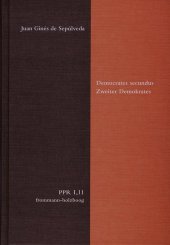 Neuerscheinungen 2018Stand: 2020-02-01 |
Schnellsuche
ISBN/Stichwort/Autor
|
Herderstraße 10
10625 Berlin
Tel.: 030 315 714 16
Fax 030 315 714 14
info@buchspektrum.de |

Matthias Lutz- Bachmann, Thomas Duve, Alexander Fidora, Heinz-Gerhard Justenhoven, Matthias Lutz-Bachmann, Andreas Niederberger, Christian Schäfer, Juan Ginés de Sepúlveda
(Beteiligte)
Democrates Secundus / Zweiter Demokrates
Herausgegeben von Schäfer, Christian; Duve, Thomas; Fidora, Alexander; Justenhoven, Heinz-Gerhard; Lutz-Bachmann, Matthias; Niederberger, Andreas; Mitarbeit: Schäfer, Christian; Übersetzung: Schäfer, Chr
2018. LXXIV, 266 S. 24.5 cm
Verlag/Jahr: FROMMANN-HOLZBOOG VERLAG E.K. 2018
ISBN: 3-7728-2700-4 (3772827004)
Neue ISBN: 978-3-7728-2700-6 (9783772827006)
Preis und Lieferzeit: Bitte klicken
Der bedeutende Humanist Juan Ginés de Sepúlveda (1490-1573) war der große Widersacher von Bartolomé de Las Casas in der während des 16. Jhdts. öffentlich ausgetragenen Kontroverse um die Rechtfertigung der spanischen Eroberung der Neuen Welt und der Versklavung ihrer Ureinwohner. Seine Sicht legte Sepúlveda im Dialog ´Democrates secundus´ vor, dessen Hauptargument darin bestand, nachzuweisen, dass es sich bei den Bewohnern der Neuen Welt um Barbaren von der Art handelte, die Aristoteles in seiner ´Politik´ als "Sklaven von Natur aus" definiert hatte. Die spanische Conquista sei daher einerseits aus Gründen der humanitären Intervention zur Unterbindung weiterer unmenschlicher Gräueltaten zu rechtfertigen, und andererseits zum Nutzen der Unterworfenen, die eine ihrer natürlich sklavischen Wesensart entsprechende despotische Herrschaft erhalten würden. Sepúlveda versucht, diese Auffassung durch die Lehren großer Philosophen, Theologen und Juristen in gelehrter Ausführlichkeit zu belegen.
When in 1550 and 1551, Juan Ginés de Sepúlveda and Bartolomé de Las Casas famously quarreled over the justification of the Spanish conquest of the New World before the Royal and Supreme Council of the Indies at Valladolid, their arguments mostly repeated and reflected a longstanding tradition of the academic discussion of the just war theory. The main tenets of this discussion had been received, collected, expanded and transferred to the specific case of the Conquista during the preceding two generations of Spanish philosophers, theologians and experts in both laws. Particularly the erudite scholar Sepúlveda seems to have given hardly more than a brief sketch of the main tenets that were on the table in the 16th century in the debate of Valladolid, referring to the four key arguments he had assembled and learnedly demonstrated in his ambitiously written, but unpublished dialogue ´Democrates secundus or On the just causes for a war´ (at the indios). In this dialogue, the four arguments are presented and defended by a learned Greek, Democrates, who tries to prove the legitimacy of the Spanish conquest and dominion in the New World against a German called Leopold, who echoes pacifist views reminiscent of Erasmus of Rotterdam. The four arguments of the ´Democrates secundus´ are: the barbarian status of the indigenous people and their condition of natural slaves, their offenses against Natural Law, the need for humanitarian intervention given the widespread practice of human sacrifice and anthropophagy, and the right of free religious and cultural exchange. As Sepúlveda presents these arguments, he is eager to show that all of them were advanced by philosophers, jurists and theologians of high reputation: Augustine and Thomas Aquinas, Ulpianus and Gerson, and, above all, Aristotle, whose political philosophy is the basis for Sepúlvedas reasoning throughout the dialogue. It was precisely this kind of reasoning that transferred Aristotle´s theory of natural slavery to the people of the New World which was responsible for the harsh criticism that Sepúlveda had to face from Las Casas and most other Spanish theorists of the time. Due to this criticism, Sepúlveda´s dialogue was never given the royal privilege to be published and it was only in the late 19th century that the first of a very small number of extant manuscripts of the ´Democrates´ secundus was rediscovered.


